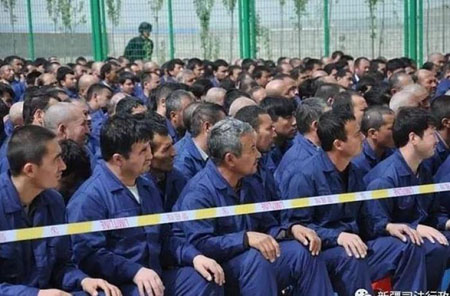Special to WorldTribune.com
A high-level UN panel has slammed Beijing’s ongoing and egregious human rights abuses in the western Xinjiang regions of the People’s Republic. China’s human rights violations have been committed through the use of “severe and undue restrictions” that are “characterized by a discriminatory component, as the underlying acts often directly or indirectly affect Uyghur and other predominantly Muslim communities.”
In other words, the Beijing regime is targeting specific ethnic and religious communities for discrimination and violence.
The presentation, “The situation of Uyghur and other Turkic Muslim minorities in Xinjiang,” followed the report by the UN High Commissioner for Human Rights, (OHCHR) which found credible evidence of patterns of torture, forced medical treatments, forced labor, incidents of sexual and gender-based violence, violations of reproductive rights, and the destruction of religious sites. This is in addition to the widespread use of massive detention and re-education camps for over a million local residents.

A statement by the panel cited, “In 2017, reports began to emerge of severe restrictions on the freedoms of religion or belief, movement, association and expression in Xinjiang, China. Over the past few years, numerous open-source reports corroborated these accounts.”
The high-level event was sponsored by 23 countries including the United States, Canada, Germany, France, Turkey and the Baltic states among others.
Fernand de Varennes, UN Special Rapporteur on Minority Issues, speaking in the context of the OHCHR report released in August, spoke of “crimes against humanity” and cited “sterilization, forced abortion” among crimes. He spoke of “collective targeting of an ethnic group” which raises “deeply dark connotations.”
Ms. Jewher Ilham, a noted Uyghur Rights Advocate passionately presented a litany of crimes in Xinjiang. Her own father, an Islamic scholar, has spent eight years in solitary confinement in a Chinese prison as part of a life sentence.
The “Xinjiang Uyghur Autonomous Region,” situated in the northwest, is China’s only majority Muslim population area. China’s communist regime claims their actions are rooted in counter-terrorism and social “de-radicalization efforts”.
Ms. Tirana Hassan from Human Rights Watch (HRW) asserted that a recent human rights resolution to debate the treatment of Uyghurs and other mostly Muslim minorities, “lost by a hair 19 to 17, with 11 abstentions.” Thus, this American-led call for a debate and an inquiry on the report was rejected. She pressed for going forward with a new resolution saying, “the original resolution did not go far enough.”
Many of those voting “no” were Muslim-majority countries such as Indonesia, Pakistan, UAE and Qatar. Among the 11 countries that abstained were Argentina, India, Malaysia, Mexico and Ukraine.
According to an HRW report on China last year, “As many as a million people have been arbitrarily detained in 300 to 400 facilities, which include “political education” camps, pretrial detention centers, and prisons.”
Significantly, “The United States State Department and the Parliaments of Canada and the Netherlands have determined that China’s conduct constitutes genocide under international law.”
U.S. UN Ambassador Linda Thomas-Greenfield stated, “The long-awaited United Nations Office of the High Commissioner for Human Rights report on Xinjiang laid out the PRC’s human rights violations in horrifying detail…These and other findings leave no room for doubt: The PRC has committed gross violations of human rights. Their actions are, without question, crimes against humanity. The question before us is how will we respond?”
The ambassador answered forcefully, “Here is my response: The United States will continue to shine a light on the PRC’s genocide and crimes against humanity, against Uyghurs and members of other religious and ethnic minority groups in Xinjiang.”
Shortly thereafter, the UN’s Third Committee dealing with human rights strongly condemned China’s abuses, stating “We are gravely concerned about the human rights situation in the PRC.” Among 50 countries signing the statement included Canada, the U.S., most Europeans, Turkey and Japan.
Given that the Uyghur people in Xinjiang are ethnically Turkic, it was encouraging to see the Turkish government supporting the human rights resolution. Yet Turkey was the only majority Muslim government to stand up for the religious and cultural rights of the Xinjiang Muslims.
Why? Political intimidation tactics from China. The cold political calculus remains that Foreign Ministries in much of the Arab and Islamic world are politically pressured to look politely the other way to the sustained and systematic persecution of the Muslim faithful inside China.
It’s incumbent on the 47-member Human Rights Council to remain seriously engaged in monitoring the genocide in Xinjiang. Beijing’s bullying seems to work, but for how long?
John J. Metzler is a United Nations correspondent covering diplomatic and defense issues. He is the author of Divided Dynamism the Diplomacy of Separated Nations: Germany, Korea, China (2014). [See pre-2011 Archives]

 By
By